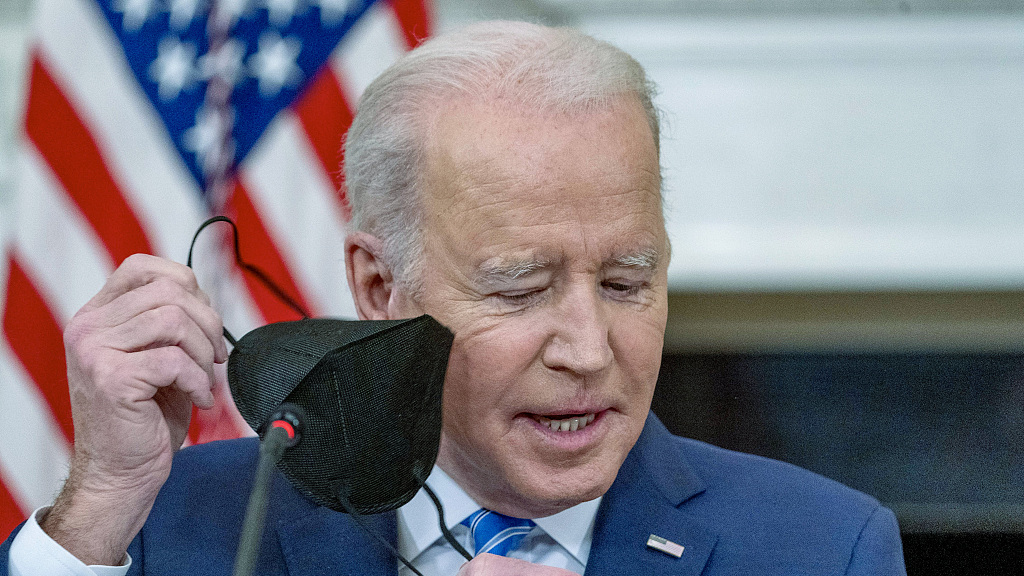
U.S. President Joe Biden takes off his mask to speak during a meeting in the State Dining Room of the White House in Washington, D.C., January 26, 2022. /VCG
U.S. President Joe Biden takes off his mask to speak during a meeting in the State Dining Room of the White House in Washington, D.C., January 26, 2022. /VCG
Editor's note: Abu Naser Al Farabi is a Dhaka-based columnist and analyst focusing on international politics, especially Asian Affairs. The article reflects the author's opinions, and not necessarily those of CGTN.
One year has already gone by since Joe Biden took the oath of office as the 46th president of the United States. Analysts from diverse domains have started to shed light on his year-long presidential ledger book and prepare a balance sheet to estimate his successes and failures so far. But, with an America, when he was sworn in, politically more fractured, democratically more fragile and internationally less credible, the typical yardstick, usually used to craft his predecessors' presidential score-cards, would qualitatively be less representative in measuring his first year in office.
It is important to look the other way around when the anti-democratic strain left by his predecessor on the very fabric of U.S. democracy has already been bloated enough to tear it apart and the confrontational foreign policy, particularly over the last decade, has reached an edge risking large-scale conflagration. Given the circumstance from where Biden had kicked off his presidential journey, it would be better to evaluate how much he has managed to heal the widespread wounds America is enduring.
But, far from curing those wounds, it seems that so far he is largely walking the same path as his predecessor, leading to further aggravation. In words, he seems an epigone of Barack Obama but, in deed, he emerges as Donald Trump's surrogate.
To start with America's democracy at home, the very chest-beating aspect of U.S. exceptionalism is crawling near-collapse, if not enter a death spiral. Since the January 6 Capitol Hill insurrection, whipped up by Trump in a bid to block Joe Biden's certification as president and snatch re-election, election-time violence and domestic strife has gained popular acceptance in American society to such an extent that, according to a recent poll, one in three Americans believes violence against the government is justified. More importantly, even though Trump has been proven to be the key figure in instigating January 6 riot, 72 percent of Republicans believe he bore "slight" responsibility or "none at all."
Trust in the electoral system has plummeted to such a frightening level that more than half of the Republicans believe Biden has won the White House thanks to electoral fraud. Moreover, it is an ugly exposure of political polarization in the United States. With a potential for fallout in the future, around 38 percent of all adult voters, with another 67 percent of Republicans, say that they will not trust the 2024 presidential election if their candidates don't win.

A COVID-19 testing site along a Manhattan street in New York City, January 21, 2022. /VCG
A COVID-19 testing site along a Manhattan street in New York City, January 21, 2022. /VCG
Amid these gruesome developments, another chilling but silent anti-democratic meltdown has been taking place across the election administration and state legislatures. According to the Brennan Center, a non-partisan public policy institute based in New York City, 216 bills were introduced across 41 states over the last year (34 of them already passed in 19 state legislatures), with clear aims to politicize, criminalize or interfere with election administration. Besides a number of legislative bills are on the pipeline to be passed, aiming at voter suppression and election subversion.
As Trump's alleged "2020 election fraud" gains more ubiquity in American society, along with his increasing grip on the Republican Party, a frenzied rush is on full display to tamper the election mechanism in its favor, keeping the 2022 midterms and the 2024 presidential election in mind. Partisan control over the election administration is being undertaken at an unprecedented scale. Threats, harassment and attacks against professional and impartial election officials are rampant all around, and, has even reached a level that, according to Brennan Center, "one in three election officials in the U.S. feel unsafe in their job and one in six had received threats."
Amid such desultory conditions at home, it seems Biden is rather engrossed in the belligerent playbook that his predecessors played out against America's imaginary rivals. It is well acknowledged that Trump's presidency made an unprecedented dent in U.S. credibility both at home and abroad. Biden's accession into the presidency was expected to be a retreat from his predecessor's path. But, more than one year on, while the U.S. domestically is symbolically burning, with its democratic system crawling to near collapse, Biden is playing the same bellicose flute, even in a harsher tune than his predecessors did.
From Ukraine to Iran, and Venezuela to China, Biden appears to be sloshing more fuel into the fires, risking all-engulfing conflagrations. Sanctions are even mounting, both in scale and number, and the sapping of hundreds of thousands of lives across Iran, Venezuela, Afghanistan and many more places; economic nationalism and misuse of trade and financial relations are still in play; military provocation and arms proliferation are turning the Pacific into more of a powder keg; and, what's going on around Ukraine-Russia crisis, an offensive military expansion and cold war-styled incitement at its edge to the escalation of an all-out war.
Considering his age and his party's disunity, it is unlikely that Biden is going to stand for re-election in 2024. Given the country's electoral system creeping toward collapse, democracy dangles on a thin thread and people reeling under the COVID-19 carnage, it is a "once and for all" opportunity for Biden to mend the menaces corroding his country's very structure at home and credibility abroad. With less than three years in his hands, Biden needs to reconfigure the current U.S. foreign policy posture and redirect time and energy to tidying up his tattered home.
(If you want to contribute and have specific expertise, please contact us at opinions@cgtn.com.)

